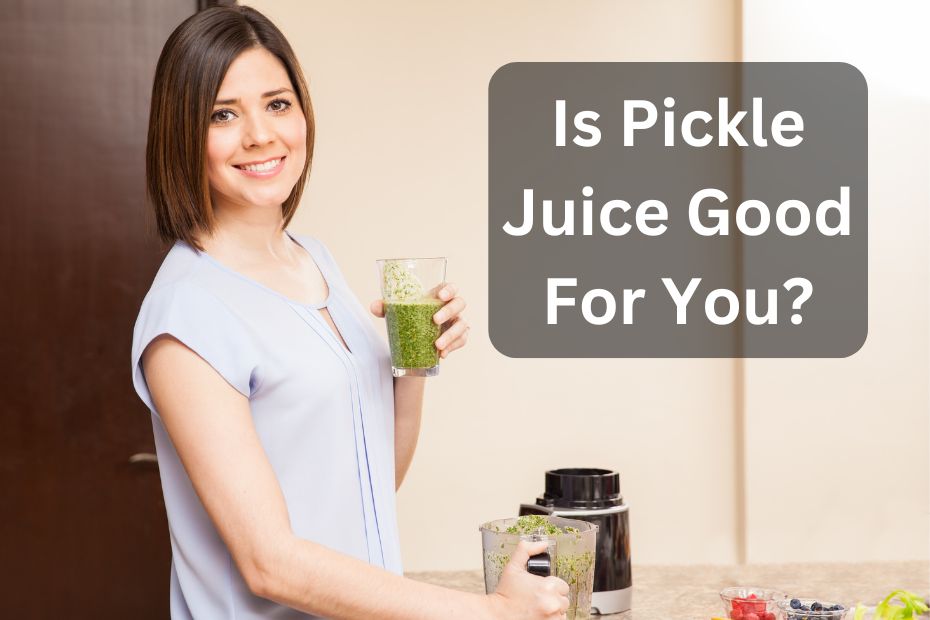Pickle juice, the tangy liquid leftover from pickling vegetables, has gained attention beyond its traditional use as a flavor enhancer or a way to preserve foods. People are now exploring its potential health benefits, leading to questions about whether pickle juice is good for you.
What is pickle juice?
Pickle juice is the brine solution used to pickle cucumbers or other vegetables. It typically contains water, vinegar, salt, and various spices.
Brief history of pickle juice consumption
Pickle juice has been around for centuries, with evidence of its use dating back to ancient civilizations like Mesopotamia and Egypt. It was valued for its ability to preserve food, as well as for its taste. Over time, people discovered its potential health benefits, leading to its consumption for various purposes.
Popularity of pickle juice for health benefits
In recent years, pickle juice has gained popularity as a potential remedy for muscle cramps, dehydration, and other health issues. Athletes, in particular, have been known to use pickle juice as a natural alternative to sports drinks.
Nutritional Value of Pickle Juice
Pickle juice’s nutritional value depends on the ingredients used in the pickling process. However, it typically contains:
- Sodium content: Pickle juice is high in sodium, which is essential for maintaining fluid balance in the body.
- Electrolytes: It also contains electrolytes like potassium and magnesium, which are crucial for muscle function and hydration.
- Other nutrients: Depending on the vegetables pickled, pickle juice may contain small amounts of vitamins and minerals.
Health Benefits of Pickle Juice
Hydration
Pickle juice’s high sodium content makes it an effective way to rehydrate after exercise or in hot weather. The electrolytes in pickle juice help replenish those lost through sweat.
Muscle cramps
One of the most well-known benefits of pickle juice is its ability to relieve muscle cramps quickly. Some studies suggest that the acetic acid in pickle juice triggers a reflex that inhibits muscle cramping.
Digestion
The vinegar in pickle juice may aid digestion by increasing stomach acid production. This can help improve digestion and nutrient absorption.
Blood sugar regulation
Some research indicates that consuming vinegar, such as that found in pickle juice, may help regulate blood sugar levels by improving insulin sensitivity.
Research Studies on Pickle Juice
Several studies have examined the effects of pickle juice on various health issues.
Muscle cramps relief
A study published in the Journal of Athletic Training found that athletes who drank pickle juice experienced relief from muscle cramps faster than those who drank water.
Electrolyte balance
Research published in the European Journal of Applied Physiology suggests that pickle juice can help restore electrolyte balance after exercise-induced dehydration.
Potential Side Effects of Pickle Juice
While pickle juice offers several benefits, it’s essential to be aware of potential side effects.
High sodium intake
Excessive consumption of pickle juice can lead to a high intake of sodium, which may contribute to high blood pressure and other health issues.
Acid reflux
The vinegar in pickle juice may trigger acid reflux in some individuals, especially those prone to heartburn.
Dental health
Pickle juice’s acidity can erode tooth enamel over time, leading to dental problems if consumed frequently.
Is Pickle Juice Good for Athletes?
Endurance athletes
Pickle juice may benefit endurance athletes by helping to prevent and alleviate muscle cramps during prolonged exercise.
Team sports athletes
For athletes engaged in high-intensity, short-duration activities like soccer or basketball, pickle juice can provide a quick source of hydration and electrolytes.
Weightlifters
Weightlifters may find pickle juice beneficial for reducing muscle cramps during heavy lifting sessions.
Ways to Consume Pickle Juice
Drinking straight
Some people prefer to drink pickle juice straight from the jar for a quick electrolyte boost.
As a sports drink
Pickle juice can be diluted with water to create a homemade sports drink, providing hydration and electrolytes during exercise.
In recipes
Pickle juice can also be used as an ingredient in recipes, such as salad dressings or marinades, to add flavor and acidity.
How to Make Pickle Juice at Home
Ingredients
To make pickle juice at home, you’ll need water, vinegar (white or apple cider), salt, and any desired spices (such as garlic, dill, or peppercorns).
Preparation
Simply mix the ingredients together in a jar or container, adjusting the ratios to suit your taste preferences. Allow the mixture to sit for a few days to develop flavor before using.
Conclusion
Pickle juice offers several potential health benefits, including hydration, muscle cramp relief, and digestion aid. However, it’s essential to consume it in moderation due to its high sodium content and potential side effects like acid reflux and dental issues. For athletes and those looking for a natural alternative to sports drinks, pickle juice can be a beneficial addition to their diet.
FAQs
Can pickle juice help with hangovers?
Pickle juice may help alleviate some symptoms of a hangover, thanks to its ability to rehydrate and replenish electrolytes. However, it’s not a cure-all and should be consumed in moderation.
Is pickle juice good for weight loss?
While some believe that pickle juice’s vinegar content can aid in weight loss, there’s limited scientific evidence to support this claim. However, it can be a low-calorie, flavorful addition to a balanced diet.
Does pickle juice have any probiotics?
Pickle juice from fermented pickles may contain some probiotics, depending on the fermentation process. However, the pasteurization process used in commercial pickling may kill most probiotic bacteria.
Can pickle juice help with heartburn?
Despite its acidity, pickle juice may actually worsen heartburn for some individuals. If you’re prone to heartburn, it’s best to avoid consuming large amounts of pickle juice.
Is there a recommended daily intake of pickle juice?
There’s no specific recommendation for daily pickle juice intake. However, it’s best to consume it in moderation, as excessive sodium intake can have negative health effects.
